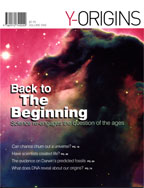THEY DON'T CALL THESE NUMBERS ASTRONOMICAL FOR NOTHING
An article in U.S. News & World Report remarks, “So far no theory is even close to explaining why physical laws exist, much less why they take the form they do. Standard big bang theory, for example, essentially explains the propitious universe in this way: ‘Well, we got lucky.’ ”1
On Christmas Day in 2002, Jack Whitaker, of Scott Depot, West Virginia, got lucky, becoming the largest single-ticket lottery jackpot winner until that time in North America. His prize? A Powerball jackpot of $314.9 million. Over a hundred million other tickets didn’t match. What are the odds of that? (And what are the odds that within two years he would be robbed twice, face charges for attacking a bar manager, be sued for making trouble at a nightclub and a racetrack, and be arrested twice for drunk driving? Not nearly as unlikely as his Powerball winning ticket, but still true.)
If someone won even two such lotteries consecutively, we would all assume the results were rigged. And yet, when it comes to life existing in our universe, the odds are far more remote than winning a hundred Powerball lotteries consecutively.
Physicist Paul Davies comments, “The conclusion must be that we live in a world of astronomical unlikelihood.”2
Donald Page of Princeton’s Institute for Advanced Study has calculated that the odds against our universe randomly taking a form suitable for life is one out of 10124, a number beyond imagination.3
To try and visualize the difficulty, imagine all the grains of sand on all the beaches on Earth. Then encrypt one grain with a special code known only to you, and randomly bury that grain on a beach somewhere on Earth. (Maybe enjoy a vacation in Maui while you’re at it).
The chance a blindfolded person would ever discover that one grain of sand on their first pick is one out of 1020 (one chance in 100 billion billion.)
Now offer a reward to anyone who can find it on one pick, even though they don’t know which beach to scour, or how deep it is buried. But what if they did? Would anyone believe they discovered it by accident? Yet, scientists tell us that the likelihood of a big bang explosion resulting in a universe able to support life like ours is many times more improbable.
As we consider the odds for the fine-tuning of our universe, galaxy, solar system, and planet, let’s keep in mind just how extreme these odds really are. Not just one, but all of them require unbelievably precise fine-tuning. Can such precision be a result of anything other than design? Let’s take a look at why many scientists are asking this question.
Back | Endnotes | Next
|




